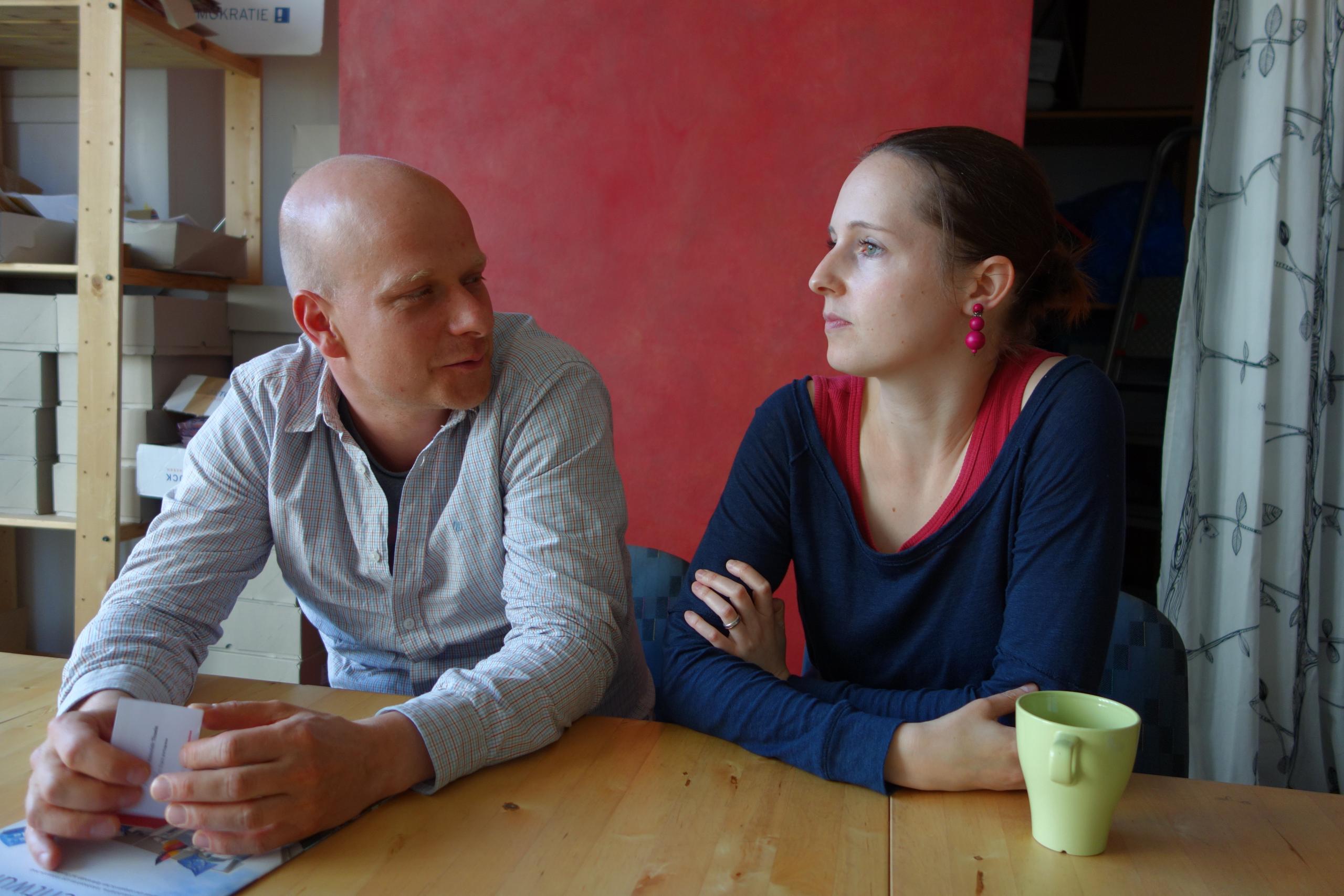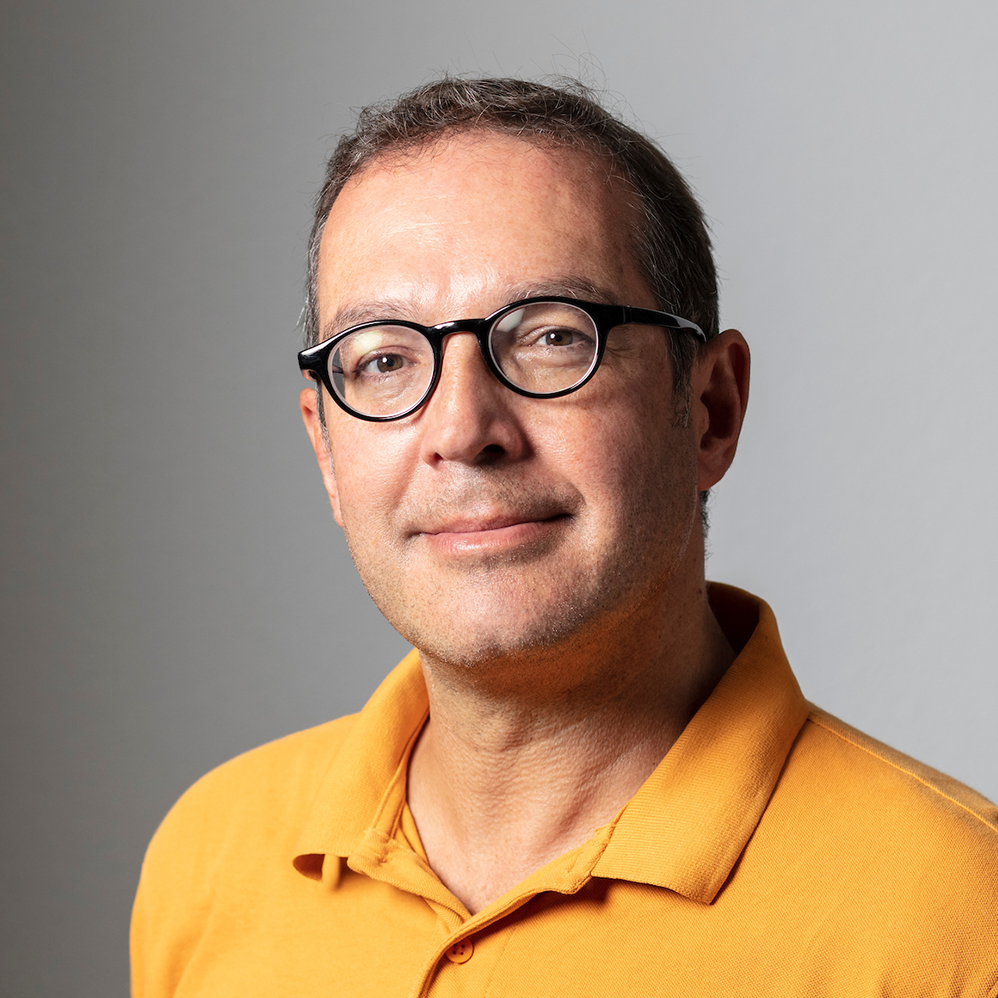
‘The Germans are finally ripe for democracy’

Germany’s More Democracy group is an example of worldwide attempts to boost citizens’ participation in politics. Two representatives of the NGO told swissinfo.ch about the potential risks of direct democracy.
The building in the heart of Berlin that houses More Democracy External link(Mehr Demokratie) is somewhat pompously called House of Democracy and Human Rights.
Close to the legendary Alexanderplatz it was this house that members of civil society met after the fall of Berlin Wall in 1989.
Today, several non-governmental groups share the postal address “Greifswalder Strasse 4” including human rights NGO Amnesty International, a feminist party and an anarchist library.
Anne Dänner is a spokeswoman of More Democracy and Oliver Weidmann is a senior member of the Berlin chapter of the group.
swissinfo.ch: What is the origin of your organisation?
Anne Dänner: It was founded in 1988 by people close to the Green Party and the Social Democrats. From the very beginning the aim was to fight for ballots at a nationwide level in Germany. We have still not reached this goal.
But we have been quite successful in promoting direct democratic elements at a regional or local level in the German Länder (states). There are currently several states and communes where we can launch ballots.
swissinfo.ch: What kind of nationwide vote do have in mind?
A.D.: Our idea is a three-phased approach. In a first step, at least 100,000 signatures have to be collected to validate an initiative. It is then submitted to parliament for discussion. If the proposal is thrown out the initiative goes back to the promoters who have to gather at least one million signatures before voters have the final say in at the ballot box.
swissinfo.ch: One of the traditional arguments against direct democracy in Germany has been that Hitler was voted in by citizens.
Oliver Wiedmann: Even the Christian Democratic Union CDU [The centre-right party of Chancellor Angela Merkel] which is no friend of direct democracy has rejected this assumption.
Historians do not believe that Hitler came to power as a result of a public vote. The truth is that the parliamentary system allowed him to rise to the top.
More Democracy
The non-profit organisation was set up in 1988. Its aim is to boost direct democracy in Germany.
It claims about 7,000 members and is funded by their voluntary contributions. More Democracy (Mehr Demokratie) is the world’s biggest promoter of citizen participation according to its organisers.
Anne Dänner studied cultural science and history of journalism at Leipzig University. She has been a spokeswoman for More Democracy since 2008.
Oliver Wiedmann studied social sciences at the Carl von Ossietzky University in Oldenburg. He joined the anti-globalisation movement Attac when he was still a student. In 2006 he became a member of More Democracy and is a representative of the Berlin chapter of the group.
The term referendum is mentioned in Germany’s post-war constitution which shows that there is no fundamental objection to direct democracy. The reason why nationwide votes are not possible is a result of the Cold War and fears that the Communists might use the method to seize power.
But 70 years after the end of the Second World War it is time to have another look to see if things have changed and if the Germans are finally ripe for democracy (laughs).
swissinfo.ch: Some recent initiatives in Switzerland – a ban on the construction of minarets (2009), the automatic deportation of convicted foreigners (2010) or the immigration curbs (2014) – have been criticised as excesses of direct democracy.
O.W.: There is indeed a risk and we’ve often questioned our own position on this issue. But the reality in Germany shows that the rightwing extremists have never used direct democratic methods where they exist at a local level or in the Länder.
Both in Berlin and in North-Rhine Westphalia have there been attempts to launch initiatives to ban the construction of minarets. But they failed to overcome legal obstacles or were declared invalid.
swissinfo.ch: Are you saying that Germany has a better system than Switzerland when it comes to direct democracy?
O.W.: There is certainly a fundamental difference between the two countries.
In Germany initiatives are vetted by an official institution before being put to a vote. This is to ensure that they are in line with international law and the country’s constitution.
In other words, a proposal outlawing the construction of minarets violates the freedom of religion enshrined in the constitution.
swissinfo.ch: If nationwide votes were introduced in Germany, who would decide whether an initiative is valid or not?
O.W.: Primarily it would be the task of the interior ministry. The constitutional court would consider cases where an initiative was found invalid.
swissinfo.ch: One of the former leaders of the anti-Islamic PEGIDA movement recently founded the association Direct Democracy in Europe. Its aim is to force a ballot on immigration. Do you think it is lawful to call a vote on such an issue?
O.W.: Immigration should not be treated as a national problem in Germany. This is a Europe-wide issue. What we need is a vote at a European level.
Even if I’m personally against it, I think it is a legitimate move.
A.D.: The issue could be put to a vote if it wasn’t blocked by legal wrangling. But it is not all black and white.
Being philosophical you could argue that it is part of direct democracy to be aware that it can be taken away from you. In parliament too decisions are taken based on majorities and minorities.
It is one of the big advantages of a direct democratic system that even the most disturbing demands are not decided arbitrarily. Because first a lot of citizens have to be asked whether they want a public vote.
I think PEGIDA might have failed to bring the issue to public attention. Just look what has happened in the meantime: the movement has split into small groups.
Had the movement been successful with its initiative it would have shown that immigration is a real concern for the population.
swissinfo.ch: The authorities in Stuttgart were forced to organise a referendum following massive protests by citizens in 2010 against a major project by the railways. Some politicians warned the successful ballot would set a precedent and block all major building projects in Germany. Is this criticism of direct democracy justified?
O.W.: It is a matter of perception. At the time all eyes were on the scene of the big protests. It gave the impression there would be huge demonstrations everywhere and no major projects could be realised.
But the truth is that all these big projects were completed without consultation of citizens.
swissinfo.ch: Is it a specific problem of Germany’s political system to delegate these decisions to elected parliamentarians?
O.W.: Decisions by parliament on financial matters and on certain public projects above a certain financial limit are automatically put to a nationwide vote in Switzerland. This is different in Germany where citizens have no say in such matters.
For me this is a major problem but there is another issue: Urban planning and master plans in several Länder are not subject to public votes.
The situation is quite different in states where this is possible. In Bavaria, for instance, there have been plenty of votes on such issues.
swissinfo.ch: The implementation of a rightwing initiative to curb immigration in Switzerland undermines the bilateral accords with the European Union. Doesn’t this example show that direct democracy can paralyse a whole country?
O.W.: Sure there is a risk. But why should parties not be allowed to use this political instrument? They are part of civil society and have a right to use initiatives, particularly opposition parties.
The system is being abused if initiatives are launched by the government or a majority group in parliament, I’d argue.
One should always be suspicious because the risk of abuses is quite considerable. Governments are keen to have their projects confirmed in a public vote.
swissinfo.ch: Isn’t the double referendum in Ireland on the Lisbon Treaty amending the EU constitution not a case in point? The accord was rejected in a first vote in 2008 before it was accepted by voters a year later…
A.D.: We were among the critics of the votes because it looked like the referendums were launched solely to have the public rubberstamp the government’s decision.
The problem arose because it was a top-down approach. It would not have happened when you first have to collect enough signatures to force a vote.
The examples of recent public votes in Germany show that the initiatives at a level of the Länder or in communes were launched by different social groups but also by a political party. It is not usual for a party to go it alone with a referendum.
If it nevertheless tries to do so, chances of succeeding are slim compared with cases where several groups of civil society joined forces.
The full interview was originally published in Portuguese.
Translated from French by Urs Geiser

In compliance with the JTI standards
More: SWI swissinfo.ch certified by the Journalism Trust Initiative















![The four-metre-long painting "Sonntag der Bergbauern" [Sunday of the Mountain Farmers, 1923-24/26] had to be removed by a crane from the German Chancellery in Berlin for the exhibition in Bern.](https://www.swissinfo.ch/content/wp-content/uploads/sites/13/2025/12/01_Pressebild_KirchnerxKirchner.jpg?ver=f05a5a9c)















You can find an overview of ongoing debates with our journalists here . Please join us!
If you want to start a conversation about a topic raised in this article or want to report factual errors, email us at english@swissinfo.ch.